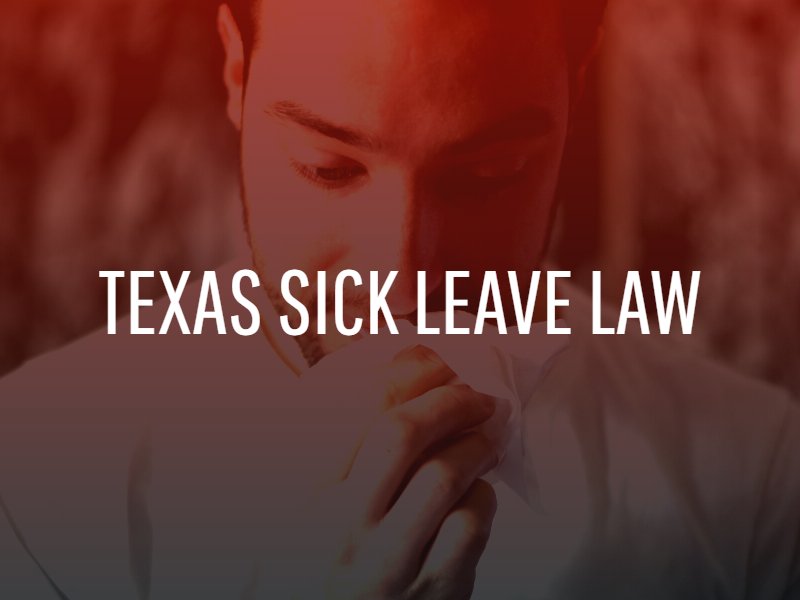Originally published by Aaron Herbert – Texas Injury Attorney.
No one plans on an illness that forces him or her out of work or into the hospital. In light of the COVID-19/coronavirus pandemic, it is clearer than ever how greatly an illness can impact a worker’s life. One of the most common questions for people who contract serious illnesses is whether they will be able to take sick leave at work, with or without pay, without losing their jobs. Unlike some states, Texas does not have a sick leave law. Unless federal sick leave laws apply, therefore, an employer could deny sick leave requests.

What Is the New Sick Day Law?
Texas does not have a state law making it mandatory for private sector employers to provide paid or unpaid sick leave. Public sector employers, however, must give their employees sick leave at the rate of eight hours per one month of employment for full-time employees. Sick leave will start to accrue the first day of employment. An eligible employee can take this leave for an illness, injury, pregnancy or to care for an immediate family member with an illness. The employee will need a doctor’s note to take three or more days of sick leave.
In March 2020, President Trump signed a law that expanded sick leave in the US to certain eligible people. The bill gives up to 12 weeks of paid family leave to parents who have to care for children due to childcare facility shutdowns connected to the coronavirus. It grants up to 12 weeks at 67% of the recipient’s average salary up to $200 per day. It can also provide up to two weeks of 100% pay reimbursement up to $511 per day. Some employers with under 50 employees are exempt from having to pay. Self-employed workers may receive these benefits in the form of a tax credit.
Can an Employer Deny Sick Days?
An employer in Texas in the private sector can deny sick days if the terms of federal sick leave laws do not apply. No state law requires employers to give their workers sick days. If an employer decides on its own to provide paid or unpaid sick leave, however, it must fulfill the terms of its policy. It is illegal for an employer to deny sick days after granting them to an employee via an employment contract, for example. Employees should carefully review their employment contracts and workplace policies before requesting sick days in Texas.
Employers in Texas must also abide by all relevant federal sick leave laws. The Family and Medical Leave Act (FMLA), for instance, gives some workers unpaid sick leave for medical and family-related matters without fear of job loss. Employers in Texas must grant eligible employees up to 12 workweeks of leave per year for covered events, such as the birth of a child, the placement of a child via foster care or adoption, or a serious health condition. An employer in Texas cannot breach a federal sick leave law by denying sick days to eligible employees.
Is PTO the Same As Sick Days?
In general, paid time off (PTO) is not the same as sick days. PTO is a package an employer can choose to give employees that bundles together different types of leave, including vacation time, personal leave, and sick days. Sick days, on the other hand, refer to just one type of leave at a company.
Can You Be Fired for Being Sick in Texas?
The answer to this depends on your status as a worker, whether you work in the private or public sector, and whether the sick leave requested falls under a federal leave law. If your employer legally has to abide by the terms of federal law such as the FMLA, you are an eligible employee and you request the leave for a valid reason, your employer cannot fire you for taking this leave. If, however, no state or federal sick leave laws apply to your employer or your situation and your boss does not have a separate sick leave law, he or she may have the right to terminate your employment for taking sick leave in Texas.
The post Does Texas Have a Sick Leave Law? appeared first on Aaron Herbert – Texas Injury Attorney.
Curated by Texas Bar Today. Follow us on Twitter @texasbartoday.
from Texas Bar Today https://ift.tt/2xZEs1I
via Abogado Aly Website
No comments:
Post a Comment